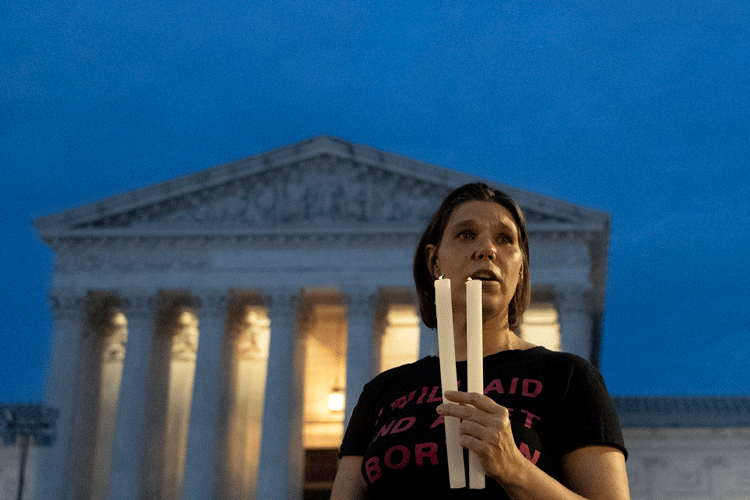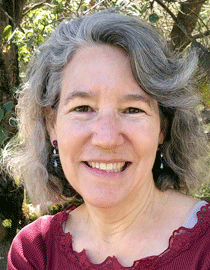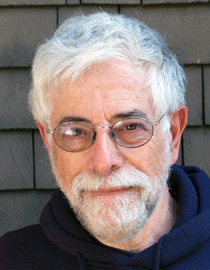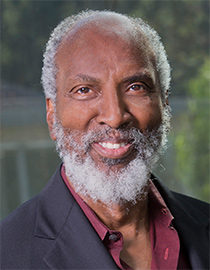Supreme Court Abortion Ruling Will Radiate Deep Into American Lives, Scholars Say

The landmark decision by the U.S. Supreme Court will almost immediately limit access to abortions in some states, but in the days and weeks to come, the shock waves will reach deeply into American life, UC Berkeley scholars say.
The ruling could eventually limit access to some contraceptives that have been effective at reducing the need for abortions. It could pose threats to same-sex marriage, and it could shape how people use software and apps that could invade their privacy.
Some said the ruling could deeply alienate religious communities outside the realm of conservative Christians — and even many evangelicals may reject it.
Berkeley News asked a range of top campus scholars for their perspectives about the decision and its ramifications. Here’s what they told us.
Beyond the immediate public health impact of sharply curtailing or banning abortion in many states, what are the public health implications of the court’s decision?

“The decision forebodes a complex landscape in which the fight for abortion rights will continue or even escalate both online and offline.
Geographical disparities in access to abortion care will widen even further. Sixteen states that support abortion will strengthen protections. California and New York plan to increase availability and funding for abortion care for out-of-state and for low-income people. In contrast, states that overturn abortion will prohibit and criminalize it.
Abortion pills will be crucial to sustain abortion access. In states where pills can be prescribed via telehealth and mailed to people’s homes, telehealth startups are already partnering with online pharmacies to deliver the pills.
Meanwhile anti-abortion groups will continue to dismiss scientific evidence and use misinformation to scare, shame, intimidate and even prosecute abortion seekers. Efforts will escalate to block contraceptives that have been crucial to the decline of abortions, including IUDs and emergency contraceptives.
In addition, many anti-abortion websites and hotlines available online collect personal information, which could lead to more racial profiling and, consequently, more distrust of health services.”
— Sylvia Guendelman, founder of the Wallace Center for Maternal, Child and Adolescent Health and professor emerita at Berkeley Public Health
How did the “originalist” interpretation of the Constitution affect this decision? Why does this matter to the LGBTQ community?

“The originalists, who now make up the majority of the Supreme Court, ground their legal reasoning in a literal reading of the words of the Constitution — a document written by a bunch of white men in the 1780s.
Justice Samuel Alito, in particular, argues that in the 18th and 19th centuries, the U.S. did not defend women’s right to pregnancy termination. So, abortion is not a right enshrined in our system.
The argument sets a new precedent for Supreme Court reasoning: Rights that are not written into our Constitution are endangered, regardless of prior Supreme Court rulings.
This has implications for a range of rights we have counted on. The Dobbs ruling matters to LGBTQ+ folks because all pregnant people, including pregnant LGBTQ people, are at risk now that the court has rejected the idea that you have a right to bodily autonomy in pregnancy.
Even more frightening is the threat to other legal rights that reflect important cultural changes, changes that are not ‘historically grounded’ and were not considered in the Constitution, such as the recent, transformative embrace of same-sex marriage.”
— Laura C. Nelson, Department of Gender and Women’s Studies professor and chair
Does the Supreme Court’s ruling on abortion reflect widespread doctrine in the U.S. religious community?

“In ending the constitutional right to abortion, Alito acknowledged, ‘abortion is nothing new.’ But, he insisted, ‘the right to abortion is not deeply rooted in the Nation’s history and tradition.’ Thus, he destroyed it.
Abortion is nothing new, and neither is tension over it.
Abortion is nothing new, and different religious approaches — from Jewish law’s insistence that the pregnant person’s life always comes first to the Catholic Church’s view that abortion is morally wrong — reflect longstanding divides.
Abortion is nothing new, and delegating decisions to state legislatures will not resolve clashes over it.
Abortion is nothing new, and religious people seek, have and provide them — now, as in the past and the future.
Abortion is nothing new: It is health care and, sometimes, a religious act. But the Dobbs majority scorns with silence. It assiduously avoids mentioning religion while embodying and conveying conservative Christian anti-abortion arguments.
Abortion is nothing new, and the Supreme Court majority deems its decision medically minor, religiously neutral, constitutionally obvious and politically inconsequential. It is anything but.”
— Ronit Y. Stahl, associate professor of history and an affiliate of the religious diversity cluster of the Othering and Belonging Institute, the Berkeley Center for the Study of Religion, the Center for Jewish Studies and the Center for Research on Social Change
How is this ruling likely to play out in the U.S. religious community? How popular will it be?

“The biggest development in American religious life in the last generation has been the swelling numbers of Americans who tell pollsters that they have no religion — from less than 10% around 1990 to about 25% now.
The greatest driver of this disaffection has been the growing politicization — conservative politicization — of churches and ministers, in particular their activism on personal morality and lifestyle issues such as sex, drugs and gay rights.
First liberals and then moderates reacted by, in effect, saying, ‘If that’s what organized religion is about, count me out.’ The Catholic church and mainstream Protestant denominations saw many exits, and now even Southern Baptist membership is dropping.
The overthrow of Roe v. Wade will convince many of the defectors that they were right to disdain organized religion. Others who have stayed in church despite doubts may now also withdraw — if there are even that many moderates left to defect.
In any case, the overthrow of Roe v. Wade will surely increase the polarization between religious conservatives and the growing population, mainly young, of ‘nones.’”
— Claude S. Fischer, sociologist, Distinguished Professor of the Graduate School
Given the unknowns of how abortion bans will be enforced, do period-tracking apps and other software pose a threat to women’s privacy and freedom?

“In our 2019 research, we found that period-tracking apps vary in who they share users’ data with. Today, more companies are aware that users generally don’t want their data shared without permission.
However, many companies’ privacy policies contain a clause saying they may share personal data when asked by law enforcement or faced with a subpoena, which could present new risks in states where the legality of reproductive health services has changed.
Users may investigate if they can request to delete their personal data, which often requires sending an email as outlined in a company’s privacy policy.
But it’s more than period-tracking app data. Things like location data, browsing history or text messages can be used to track or infer someone’s reproductive health activities. Organizations like the Digital Defense Fund or Electronic Frontier Foundation have created user guides about protecting one’s digital privacy and security with regards to reproductive health.”
— Richmond Wong, postdoctoral researcher at the Center for Long-Term Cybersecurity
With the midterm elections approaching and the 2024 presidential campaign less than two years away, how might the court’s decision on abortion play out in U.S. politics and elections?

“The court decision will have a major impact on the lives of many Americans, particularly in states where Republican-controlled governments have adopted (or will soon adopt) laws that restrict or even eliminate access to abortion.
The political implications are harder to forecast. There will certainly be a substantial mobilization among pro-choice voters. This could have a substantial impact in the midterm elections if it reduces the big enthusiasm advantage that Republicans have been expected to hold.
But amid President Biden’s low approval ratings and concerns about the economy, there are strong headwinds that will make it very hard for Democrats to hold the House and Senate and to make gains at the state level. So, it is possible that the short-term electoral impact will be limited, even as today’s decision sets the stage for a much longer-term battle for the future.”
— Eric Schickler, political scientist and co-director, Institute of Governmental Studies
How does this decision impact the way we will view the Supreme Court’s process moving forward?

“What the court has done, and threatened to do, is nothing short of a tragedy that must not stand. I believe this decision, and how it came about, causes serious concerns over the legitimacy of the court.
In route to being confirmed on the Supreme Court, more than one soon-to-be justice indicated that they would respect the ruling in Roe. Those promises were not kept. When President Obama nominated a moderate to the court, the Republicans would not even give him a hearing. The goal was to pack the court with conservatives, and they were successful.
We have watched this country turn its back on its own institutions in its attack on people of color, voting rights, and now women and their right to control their bodies.
I grieve for women — for much of our history, women have been treated as the other, and as something to be controlled and dominated. I also grieve for our country.
Still, we are not done. We can still work for a larger collective and listen to and embrace our differences.“
— john powell, director of the Othering and Belonging Institute and professor at Berkeley Law
